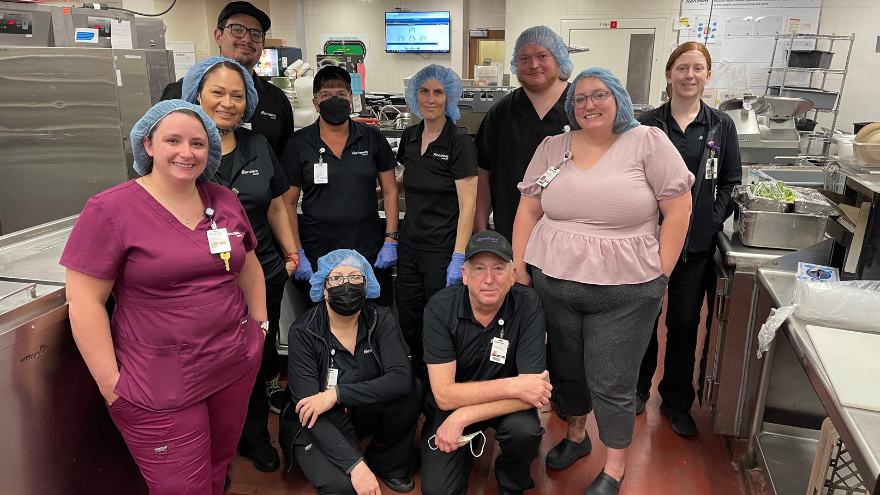Search
-
Estate Planning Mistakes to Avoid
August is National Make-a-Will month. We talked to Renown Health Foundation Planned Giving Officer, Abbey Stephenson, to learn more about wills, trusts, and estate plans and why you should feel motivated this month to get started. Did you know that 2/3 of Americans don't have a will or trust? If this is you, don’t worry, you’re not alone. Although there are laws in place to determine who inherits your assets if you die without a will or trust, having a will or trust ensures your assets go where you want them to go after you are gone. They can also help minimize disputes between family members and heirs about who gets what. In Nevada, the laws that govern who gets what if you die without a will or trust can be found in Chapter 134 of the Nevada Revised Statutes. There are other documents that people often prepare at the same time as their will or trust – like an advance health care directive and durable power of attorney for assets. These documents all together are called an estate plan. Although they have other purposes too (like nominating a guardian for a child, planning for disability or avoiding probate, which is a court process), wills and trusts are documents that say who will receive your assets after you are gone. The most common type of trust is often called a revocable living trust or a family trust. People who have a trust usually still have a will, although it is a shorter form of will called a pour-over will. It’s a good idea to talk to an estate planning attorney about whether or not a trust makes sense for your family or circumstances. Now that you’re ready to get started, here are some mistakes to avoid: 1. Failing to plan Not setting aside the time to plan may be the biggest mistake. Failing to prioritize preparing or updating your estate plan means your last wishes and desires may not be fulfilled. The right documents memorialize what you would like to happen upon your disability and death so that other people can know and follow your wishes with respect to your care and your assets. 2. Failing to coordinate beneficiary designations Certain types of assets like life insurance and retirement accounts are not covered by your will or trust and need to be addressed separately. These types of assets are referred to as non-probate assets because they transfer under contract principles and don’t require court supervision or probate to be distributed to the named beneficiaries. By completing beneficiary designation forms provided by the retirement account custodian, insurance company or financial institution, you can direct your assets to one or more beneficiaries. 3. Failing to title your assets properly Asset titling refers to how you own your asset – such as in your individual name, jointly with someone else, or in a trust or entity. For example, assets titled for two people with a “right of survivorship” will automatically go to the surviving owner. Review your asset titling and make changes, if needed, to ensure your property and assets are passed down the way you intend. 4. Failing to include charities meaningful to you In addition to providing for family members and other important people in your life, you many also choose to give to charities meaningful to you in your estate plan. When you include a charity in your estate plan, that gift is called a planned gift and many charitable organizations, including Renown, recognize such donations through their legacy giving societies. As you prepare to make your own will or a more comprehensive estate plan, we recommend you consult with a lawyer. Here are some free resources that may be helpful too: Renown Health Foundation is proud to sponsor the Family Estate Planning Series put on by PBS Reno and the Community Foundation of Northern Nevada. The free, 8-week course of 90-minute, in-depth workshops is a great place to learn much more and to help you get started in the planning process. The next course begins on September 7, 2022. More information can be found here. Renown Health offers periodic advance health care directive workshops where attendees can learn about, complete, and sign their directive. The next workshop is scheduled for September 14th. More information can be found here. The American College of Trust and Estate Counsel provides information on a number of commonly asked estate planning questions here. If you are interested in including a charitable gift to Renown in your estate plan, we would be happy to talk to you about how your gift will make a difference for our mission. Please contact Abbey Stephenson at abbey.stephenson@renown.org or visit renown.org/LegacyGiving to learn about Renown Health Foundation’s Legacy Giving Society and ways to give.
-
Department Spotlight: Food & Nutrition Services
Nutrition is a vital aspect of patient care. At Renown Health, the Food & Nutrition Services (FNS) teams take their mission of delivering patients high-quality, cost-effective, nutritious and attractive foods to the next level. From a thrice-daily trayline service with a wide variety of delicious food to the personalized dietitian services that ensure every patient gets the nutrients they need for optimal healing and recovery, Renown’s FNS teams at Regional, South Meadows and Rehab are unmatched. Food for the Good Fight The hustle and bustle of early morning food preparations gears the FNS team up to, as Renown Regional Food Service Worker Molly Kalsman puts it, “provide patients with adequate nutrition to heal.” From morning until nighttime, the team prepares three meals a day along with late trays and snacks. This isn’t your run-of-the-mill hospital food, either. Think anywhere from cheeseburgers and salads to pork roasts and baked potatoes. As you can imagine, food of this caliber requires all hands on deck in the kitchen, especially during trayline times, to ensure all patients receive quality meals that meet their individual nutrition needs. “We make an impact with good service and great food,” said Mario Nunez, a Food Service Worker at Renown South Meadows. As the food service workers are hard at work cooking and assembling, the nutrition representatives visit each patient to learn their individual dietary restrictions, allergies and food preferences. For Julie Macaluso, Nutrition Representative at Renown South Meadows, “letting the patients choose their meals” is one of the highlights of her job. “We go over meal choices for their stay, so the patient can pick out something they would like to eat and find enjoyable,” added Tara Sprehe, Nutrition Representative at Renown Regional. The immense care and attention our nutrition representatives give to every patient paves the way for our clinical dietitians to build a nutrient-dense diet plan based on the individual patient’s preferences. Dietitians are the only licensed providers that can leverage nutrition to treat, manage and prevent illness and disease to improve patient outcomes. Every day, our experienced dietitians “make recommendations in the adjustment of macro and micronutrients in order to best manage a person’s health status in the setting of trauma, diabetes, heart disease and other morbidities,” said Jessica Blauenstein, a Registered Dietitian and Board-Certified Specialist in Oncology Nutrition at the William N. Pennington Cancer Institute. Overall, for this department, the phrase “that’s not my job” will never be heard, according to Lupe Ayala, a Cook at the Renown Rehabilitation Hospital. Day-in and day-out, it’s a massive group effort – and that’s the way they like it. Setting the Service Bar High Hitting milestones and accomplishments comes naturally to this crew. The FNS team sets the bar incredibly high for food and service standards across the Renown Regional, South Meadows and Rehabilitation hospitals. The key ingredient? Synchronized teams that operate like a well-oiled machine. The meticulous trayline schedules and assembly lines, the cooks that put their heart into patient meals, the nutrition representatives and dietitians who ensure patient food wants and dietary needs are being met... the list goes on. And to top it all off, these teams certainly know the meaning of “service with a smile.” Their efforts do not go unnoticed. “I am very proud of the team I have,” said Monica Lara-Yanez, Supervisor of Food and Nutrition Services at Renown South Meadows. “They have improved their knowledge and participated in cross-training, and they are very efficient doing their jobs and helping each other. Moreover, they care about the service we provide.” One major accomplishment the FNS department achieved in recent years was implementing Room Service Connect, which aids in direct communication with patients, letting them know what foods are available to them during their stay at Renown based on their dietary needs. Locating trays of food has also never been easier. According to Tara Sprehe, “This system is also beneficial for letting food service workers know when a diet has been upgraded, discontinued, changed to NPO status or downgraded. This reduces the risk of giving the patient a diet that is not appropriate for them,” which saves both time and money for the department. At the end of the day, the FNS department has one mission, and it’s the same mission we all employ as Renown team members: do it for the patient. “It’s all about patient care,” said Jesse Holman, Cook Lead at Renown Regional. “That is the best accomplishment!” A Dedication to Renown The patients, the providers, and the passion: these are the most common themes that keep the FNS department passionate about Renown and their team. Whether they are just starting out in a career in food service or have established themselves in the clinical field, the FNS department proudly upholds the greatest standards of nutritional care that enhance Renown’s status as a top healthcare leader in northern Nevada. “I choose Renown because it is a very distinguished institution with an amazing reputation, offering a lot of benefits and growth opportunities to employees,” said Monica Lara. “It makes me feel proud to say, ‘I work at Renown.’” Renown Rehab Food Service Worker Margretta Corbet echoes this sentiment, adding, “There are good people here with happy dispositions.” Many FNS team members are especially enthusiastic about Renown’s robust benefits and career growth opportunities. For Molly Kalsman, working at Renown gives her the experience necessary to enter a career in dietetics. “Food service and hospital experience is encouraged to be accepted into a dietetics internship program, and Renown was the perfect opportunity for me to gain that experience,” said Molly. Carleigh Bates, Nutrition Representative at Renown South Meadows, is on a similar path: “Renown is a vehicle for so many things I am aspiring towards, such as getting my foot in the door for working in healthcare, improving the experiences of patients and gaining experience that will aid in my future goals.” Carleigh emphasizes that the team’s commitment to Renown’s mission is at the core of what they do every day. “We impact patient care by providing nutrition to fuel their wellness and improve their stay.” Lupe Ayala wraps up this strong conviction from the team very well: “I didn’t choose Renown; Renown chose me.” Fight the Good Fight With Us This future-minded, patient-centric department is growing! The Food & Nutrition Services teams at Regional, South Meadows and Rehab are actively hiring eager, collaborative new team members. Natasha Frisbie, FNS Lead at Renown Regional, reports that the team has “successfully hired and trained 24 new employees in the past three months” and is still expanding. “Teamwork, communication, and enthusiasm are very valuable skills to have in this department,” said Molly Kalsman. If you or anyone you know is looking for their next growing career opportunity, apply today!
Read More About Department Spotlight: Food & Nutrition Services
-
Bye-Bye Holidays, Hello Routines! Getting Kids Back into the Groove
The kids are back in school and the holidays are all but a distant memory: Now what? Karen Wagner, APRN, offers specific tips about getting kids back to their routines in the post-holiday-hustle-and-bustle. Are you finding the kids struggling with bedtime routines? Having trouble getting them to tackle homework? There’s a simple reason: The holidays messed with their mojo! Here, we talk with Nurse Practitioner Karen Wagner about what to do to get them back on the straight and narrow. Why Routines Are Important “Holidays are a fantastic time to get together with family and friends, so our routines are usually off — and this is understandable, “Wagner says. “While the holidays are exciting, they are chaotic and can put our kids out of the routines.” So how do you get kids back into those routines they crave? “Consistency/routines are crucial for our kids,” she says. “Most people — kids and adults — experience a let-down feeling after the holidays, and post-holiday adjustment takes time.” So what can we do, specifically? Wagner recommends the following: Re-establish family routines, including before- and after-school programs or child care routines. Once kids are back on the regular schedule, they’ll find that sense of familiarity as the old routine returns. But keep in mind, this won’t happen overnight. Encourage healthy eating, as the upheaval of their schedule can be offset by a balanced diet. Make sleep time a priority: Keep in mind that it might take up to three nights of strict bedtime to get them back on track. But enforcing normal bedtime will get their bodies back on a normal schedule. Return to usual chores and expectations. Nothing encourages a return to routine like reminding them of the basics. Incorporate indoor and outdoor time. They likely spent lots of time outdoors during our unseasonably warm winter break — and they even had a snow day or two! So encouraging both indoor and outdoor time will help them return to a circadian rhythm and tire them out from exposure to fresh air. “It is never too early to encourage a love for physical activity in kids by exposing them to fun fitness activities and sports,” Wagner says. “Physical activity improves bone health, cardiorespiratory and muscular fitness, decreases levels of body fat, reduces symptoms of depression, and improves cognitive skills and the ability to concentrate.”
Read More About Bye-Bye Holidays, Hello Routines! Getting Kids Back into the Groove
-
Blissful Banana Muffins
Go bananas with this healthy muffin recipe that's easy to make using three ripe bananas and a few everyday ingredients hidden in your pantry. Benefits include low sugar, naturally gluten-free, and just over 100 calories each. We think this is the perfect after-school snack!
-
10 Winter Activities to Explore with Your Family
Winter is a season that is loved by many. It is the time of year when families get to enjoy outdoor activities such as snow and ice-skating and indoor activities such as cooking or playing board games with family. But because the temperature outside is a little more frightful, it can make us need to think a little more creatively about what activities the kids in our lives might enjoy. We have you covered, here are 10 ways to keep children entertained and enriched even when the weather is not sunny Reno, we all know and love. 1. Ice Skating Enjoy the family fun of gliding and twirling around at The Ice Rink at Grand Sierra Resort or check out Reno Ice. Both ice rinks offer public skating sessions for all ages. 2. Movies Watching movies has always been a great activity. Check your local listings to find a theater convenient to your location. 3. Snow Play The Winter is a time that many people use to take advantage of all the snow and ice our area has to offer. People enjoy snowball fights and rolling downhills. It is a great time for kids to have fun in the snow with their friends. 4. Scrap-Booking Being crafty is a great way for the whole family to have fun. Scrapbooking can be done with most of the supplies lying around the house. 5. Write Letters to Our Troops Operation Gratitude sends letters from civilians thanking troops, veterans, and first responders for their service. Recipients say these letters, notes, and drawings are the most cherished items they receive all year. Check out Operation Gratitude for a downloadable guide on how to write a letter to a service member. 6. Nevada Museum of Art Channel your inner Picasso and have fun exploring your artistic side in this monthly HandsONatHome, a family fun experience with different projects and ideas inspired by the collection. Plan your visit. 7. Homemade Activities Create homemade playdough using a handful of ingredients in your pantry. It takes about 10 minutes to make and is sure to get their creativeness flowing. Here is an easy recipe to follow. 8. Cooking Cooking can be fun, especially when you can involve the kids. Pick a recipe that is fun and easy to make and pull the kids in for some help in the kitchen. 9. Discover The Discovery Museum The museum has over 10 permanent exhibitions and a calendar full of activities that families can explore throughout the year. Let's Discover! 10. Who’s Got Talent? This is an activity with so many possibilities, and it's great for all ages, including grown-ups. If you are working, the kids might put together a show and perform for you later. Or the whole family could show off their talents to visiting guests. Click here for ideas.
Read More About 10 Winter Activities to Explore with Your Family
-
4 Fantastic Health Benefits of Being Clutter-Free
The Benefits of Being Clutter-Free Gives you a better sense of well-being. Did you know procrastination is linked to clutter? According to a recent study clutter problems led to less life satisfaction, especially among older adults. Helps you lose weight. Constantly being in cluttered room, office or car can be stressful. All the undone cleaning tasks in the back of your of mind cause stress, which is linked to obesity. Promotes mental health. Having clutter around can make you feel anxious or overwhelmed. This prevents you from truly relaxing or focusing. Saves you money. It’s not a secret that money worries cause stress. According to a Journal of Consumer Research study, you’re more likely to make a purchase when you’re sitting in a messy room compared to a tidy room. Clutter-Free Tips Start with a plan. Make a list of your clutter-improvement priorities and the tasks needed to accomplish each one. Focus on one section of your home per week, so you don’t get overwhelmed. In fact, organizational expert Peter Walsh suggests starting with the easiest room first to gain momentum. Conversely, "The Life-Changing Magic of Tidying Up" author Marie Kondo suggests organizing by category (for example clothing or books). Experiment with an organizing plan that appeals to you. There are also many helpful on-line calendars you can use as a starting point. Delegate when you can. Include your children and spouse into your plan. Is uncle Bob an electrician? Then get him to swap out your eyesore of a ceiling fan or update an old light fixture. Of course it’s ok to outsource the duties - such as window cleaning or painting - if your budget allows. Buy less. The less you purchase the less you need to store, clean, keep track of, organize or dust. Seems simple, right? Not for everyone. On average we are bombarded with over 4,000 marketing messages a day, not to mention FOMO (Fear Of Missing Out) when we see our friends posting about their newest toys on their social media feeds. Focus on quality over quantity. When in doubt, throw it out. Still on the fence about what to throw away? Use these declutter decision-making guide questions to help you. Organize Your Health Along with taking care of your surroundings, make a commitment to get up to date on your health checkup and screenings. Preventing an illness is a bargain compared to the cost of a chronic disease. It's also a good idea to go through all of your medications and check the expiration date. Remember to properly dispose of medications. DO NOT flush medications down the drain or toilet, unless the label indicates it is safe to do so.
Read More About 4 Fantastic Health Benefits of Being Clutter-Free
-
Kindly Care for Those Who Care for You
Over the past year, the safety of healthcare providers has received more public attention than ever before. Throughout the COVID-19 pandemic – and particularly in the early days – the public learned about the vital role of personal protective equipment (PPE) and other important processes that keep healthcare workers safe and healthy. However, people may be surprised to learn that germs and viruses are just one of the many risks that healthcare professionals face every day. Many people are fortunate enough not to have to worry for their physical and mental well-being when they go to work. Unfortunately, this is not the case for countless healthcare workers across the nation, for whom workplace violence is a daily concern. According to the American Hospital Association, healthcare workers are four times more likely to experience serious workplace violence than people in other industries. This is particularly troubling knowing that healthcare workers have dedicated their careers to serving others, putting their communities first- day in and day out. What is Considered Workplace Violence? The World Health Organization (WHO) defines workplace violence as, “Incidents where staff are abused, threatened, or assaulted in circumstances related to their work, including commuting to and from work, involving an explicit or implicit challenge to their safety, well-being, or health.” WHO considers both physical and psychological harm, including attacks, verbal abuse, bullying, and both sexual and racial harassment, to be workplace violence. Responding to the Challenge of Workplace Violence At Renown Health, we have no tolerance for abuse against our employees. As an organization, we have several systems in place to support and protect our staff. During staff orientation, we provide classes to prepare employees to prevent and de-escalate verbal or physical abuse. We also offer ongoing education to train our staff to respond to violent situations. If an incident does occur, our Violence Prevention Task Force reviews incidents and ensures the impacted employees receive resources and counseling to help them process what has occurred. We are among the first in the nation to have instituted a Zero Tolerance policy on workplace violence. This policy is in place to let our employees know that we have their backs in preventing workforce violence and we will address it assertively if the environment becomes unsafe. As a leader, I am continually impressed by our team’s desire and ability to support one another. However, I know that it is my responsibility to protect our team. No one should have to face harassment or abuse – in any form – in his or her workplace. I believe so much in this cause that I volunteer as Chair of the American Hospital Association’s Hospitals Against Violence steering committee, which works to understand the causes behind violence against healthcare workers and develops tools and processes to prevent these incidents from occurring. Violence was already a concern facing health care organization leaders prior to the COVID-19 pandemic. Now, the ongoing health crisis has elevated tensions. Health care is an industry like no other, with our most precious resource being our employees. As a community, as patients and family members, we have an obligation to ensure that all healthcare workers are safe while they go about their work. This starts with understanding, communication and unequivocal support for the profession. This month we launched the Be Kind campaign across Renown, a reminder to all of the importance of values like patience, kindness and gratitude. If you would like to join us in recognizing a healthcare hero, please submit your thoughts here. Thank you for working with us, and all healthcare providers, to create and maintain places of health and healing for all – and for kindly caring for those who care for you.
-
Social Connections: Why They Benefit Your Health
Some days a chat with a friend is all you need to feel better. Why? Because humans are social beings. Although we have more technology than ever at our fingertips, sometimes we may still feel left out or disconnected. Dr. Buddy Coard, Ed.D., Psychologist at the Stacie Mathewson Behavioral Health Addiction Institute at Renown, discusses the importance of social connections and tips on how to keep connecting, warning signs of loneliness and how to feel less lonely. Why are Social Connections Important? Dr. Coard points to significant research on the topic of loneliness and social connections. He uses the findings below to detail how social connections affect our overall health. In a recent survey 40% of participants reported they sometimes or always feel that their relationships are not meaningful and that they feel isolated. Surprisingly, this survey suggests Generation Z (18-22 years old) is the loneliest generation. Another study associates loneliness as a risk factor for early death. It indicates lack of social connection heightens health risks as much as smoking 15 cigarettes a day, or having alcohol use disorder. In fact, loneliness and social isolation are twice as harmful to physical and mental health as obesity (Perspectives on Psychological Science, Vol. 10, No. 2, 2015). A 2018 study investigated several standard measures of social isolation, including marital status, frequency of religious service attendance, club meetings/group activities and number of close friends or relatives. The findings revealed race as a strong predictor of social isolation. In particular, black men and women were more likely to be lonely than were white men and women. Loneliness also switches on your body’s long-term “fight-or-flight” stress signaling system, which negatively affects your immune system. People who feel lonely have lower immunity and more inflammation than people who don’t. Dr. Coard recommends the following tips for those who feel lonely. Tips to Increase Social Connection Get outside. More and more nature prescriptions are common. In fact even a 10 minute walk can elevate your mood and get your blood flowing. Develop a schedule of activities to accomplish in a week, setting realistic goals. Monitor your technology. Of course, watching the 24/7 news cycle can be depressing. Turn off the TV and listen to music or read a book instead. Even better, use technology to connect with family members by having a virtual game night or book club discussion. Write it out. When was the last time you sent a good old-fashioned letter or card? Or even wrote in a journal? Try to brighten someone’s day with snail mail. Writing down your hopes and fears also helps you to get worries off your mind and process your emotions. With this in mind, there are also volunteer opportunities to support others by sending a handwritten letter to others battling depression. De-clutter your surroundings. Go through those old photos and put them in an album. Clean out a drawer, cupboard or closet. You will feel a sense of accomplishment and can donate items you no longer need that others can enjoy. Increase your joy by reducing your clutter. Warning Signs of Chronic Loneliness One size does not fit all when it comes to loneliness. For this reason, loneliness can be different depending on your particular situation and your unique personality. However, if you feel some (or all) of the following symptoms, chronic loneliness may be affecting you: Lack of ‘best’ or close friends. You connect with others on a surface level, but feel no one truly understands you. People are n your life, yet you are not connecting on a deep, intimate level with them. You feel lonely even when people are around. This means feeling disengaged or not part of the group when around others. You feel less than enough. You often doubt yourself or don’t feel good enough when comparing yourself to others. And social situations feel exhausting. What Can Someone Do to Feel Less Lonely? Dr. Coard offers the following suggestion for those with a lack of social connections: Talk with your doctor, psychologist or another healthcare professional. Sometimes chronic loneliness relates to longstanding negative beliefs that an individual has about themselves. Engage in behavioral activation. For example, being more active and involved in life by scheduling activities which can potentially improve your mood and decrease feelings of isolation. Initially behavioral activation can be very challenging due to lack of motivation, but setting a reasonable schedule of activities is a good start. Pay attention to your sleep. Sometimes when people become lonely they experience significant changes in their sleep cycle. Frequently they sleep too much, or too little. Make sure to maintain a normal, healthy sleep/wake cycle, following good sleep hygiene recommendations.
Read More About Social Connections: Why They Benefit Your Health
-
Tasty Noodle Salad with Thai Peanut Dressing
Looking for a main course or premade lunch recipe? We’re serving up the most delicious cold salad, perfect for when you’re craving a flavorful, crunchy, pea-nutty dish. Best of all, it’s versatile! This salad can be easily made with protein, or as vegan, and/or gluten-free. Add diced chicken or edamame beans to this refreshing dish if you need that extra protein kick. This slaw is dietitian-approved, with it having more vegetables than noodles and heart-healthy ingredients to keep you going.
Read More About Tasty Noodle Salad with Thai Peanut Dressing
-
Valentine’s Day Treats for the Whole Family
Celebrate love this Valentine's Day by making these treats that everyone in your life will enjoy. Not only are they delicious, but these sweet treats give you the opportunity to write special notes for those you love! Even the tiniest chef in your home will enjoy making these easy banana and chocolate treats for Valentine’s Day. Follow along with this video recipe today.
-
Women and Heart Attacks: Subtle Signs to Know
Heart disease is the number one killer of women – claiming one life every minute – yet many women don’t know that the signs of heart attack may not be the same symptoms they’ve learned about all their lives. In women, nearly 71% experienced unusual exhaustion in the weeks before, 50% had trouble sleeping and 42% suffered shortness of breath. Most importantly, about 43% had no chest pain. Women and Heart Attacks: The Subtle Symptoms In both men and women, the most common symptom is pressure or pain in the mid chest, but there are also more subtle signs. “Women can experience a heart attack without chest pain,” explains Letitia Anderson, M.D., cardiologist with Renown Institute for Heart & Vascular Health. “It is not uncommon for women to experience extreme fatigue, shortness of breath, dizziness, lightheadedness, nausea, vomiting and pain in the abdomen or back as their primary symptom.” Other symptoms can include: Neck or jaw pain Fullness or pressure that goes away and comes back The feeling of a rope being tied around your body and squeezed Some doctors have reported seeing patients who just didn’t "feel right." One woman simply felt more tired than usual while cleaning, while another woman reported feeling winded carrying boxes to the basement. Admittedly these are symptoms many of us would shrug or sleep off versus going to the hospital for immediate care, which is why it’s important to pay close attention to the warning signs. “Women are good at being the caregiver for the rest of the family and writing off their own symptoms as something minor, like indigestion or a muscle pull,” says Dr. Anderson. “Remember that heart attacks have early warning signs, and if they are recognized and treated in time, a heart attack can be prevented and heart damage avoided.” When You Need to Call 911 Paying attention to your body is key. If you’ve experienced any unusual or flu-like symptoms, struggled to breathe or just don’t feel right – give yourself a gut check and ask if you’ve honestly felt this way before. If you’re worried at all, you need to seek emergency care. Do not wait – call 911 immediately Take an ambulance to the hospital if at all possible Try to stay calm and take deep, slow breaths until medical help arrives.
Read More About Women and Heart Attacks: Subtle Signs to Know
-
This Couple Rocks
Renown’s Sterling Silver Club is honored to feature members of our club each season. We thank Mary and Dave for sharing their fun-loving story and all of our members for leading healthy, happy lives that inspire us all. Rock On! Rhyolite almost sounds like a rock band, but it’s not (at least not one that we are aware of). It is a ghost town near the eastern boundary of Death Valley National Park, the most silica-rich of volcanic rock – and the magma-based spark for what has become a very special relationship of our featured Sterling Silver Club member couple, Mary and Dave. “May I carry those for you?” Mary and Dave first met back in January of 2015 when they sat near each other at a financial seminar in Reno. Though friendly banter was exchanged at the time, contact information was not. It wasn’t until later that year in July when “rock karma” intervened. The two reunited unexpectedly when they joined friends on an excursion to Wonder Mountain near Fallon, Nevada to gather… Rhyolite! “I remember I enjoyed meeting Mary at the seminar and thought she was pretty, but didn’t get her phone number,” recalls Dave. “But that day in the desert, Dave asked if he could carry my rocks,” Mary smiles, “and we got each other’s numbers and began dating after that.” Since then, they’ve gone “rockhounding” all over the state. Smokey quartz brought them to Mt. Peterson, north of Reno. Daisy agates were worth a trip to Austin, Nevada. They’ve hunted for Larsonite, a rare, petrified bog wood found only in McDermott, and also venture out with the Comstock Gold Prospectors Club in search of that precious metal. Hiking, exploring and searching for interesting and colorful “finds” together make rock hunting one of the couple’s favorite hobbies. “I’m especially fascinated with petrified wood that’s been lying in the desert for millions of years until I dig it up,” says Dave. “Pretty cool!” The Pre-Rock Years Mary and her four siblings are first generation Chinese Americans. Her parents who emigrated from Malaysia to the U.S. by way of Canada after World War II and raised the family in Northern Virginia. After earning a bachelor’s degree from the College of William and Mary, our Mary started a career in software training and project management. Now retired, she occasionally goes to work helping friends and family with travel reservations. Dave and his three siblings were born and raised in Southern California. He remembers his parents taking the family camping in the Sierra Nevada mountains a couple times a year and trips out to the sand dunes in San Filipe, Mexico where they’d stay for weeks at a time. Dave began his career in the restaurant industry right out of high school and was eventually recruited to run a developer’s hotel restaurant and be his personal chef. Dave wrapped up his career in 2012 when he stepped down as executive chef at Circus Circus Reno Hotel & Casino. More recently on the non-work front, Dave’s son, Cameron, and his wife, Rebecca, have blessed grandpa Dave with a granddaughter, Madison – and there’s a grandson on the way! Getting to Know You Mary and Dave also use their time to collect travel experiences that have allowed their relationship to deepen and their appreciation of each other to grow. They’ve camped at Death Valley and locations throughout the Nevada desert and admit to more civilized stays in hotels and resorts in Ireland, Mexico, Portugal, Spain and the United States. They also spend a week every fall paddling their canoe along the shores of Lake Tahoe, which they call the most beautiful place in the world. Well, when you travel that much with someone, you really get to know them. “Mary has the clever wit to keep things interesting,” says Dave. “Plus she has the patience to put up with my little quirks and idiosyncrasies, and the gumption to keep me out of trouble!” And Dave’s cooking skills have found a fan in Mary, who’s a bit of a cook herself. “My favorite dish of his is roast duck,” says Mary. “I offered a little coaching and showed him the traditional way of serving it with steamed rice pancakes, hoisin sauce and spring onions.” Mary also enjoys spending time bulldog spotting, restoring her 1992 Mazda Miata, playing the ukulele, crocheting and knitting – and she’s teaching herself Spanish! Member-to-Member Advice Mary and Dave enjoy socializing with other Sterling Silver Club members and learning how to better care for their health at different club events. As for their advice to other members? That’s simple: “Live the best life you can by taking care of yourself and your family and friends.” The Sterling Silver Club thanks Mary and Dave for giving us a glimpse inside their ROCKIN’ relationship and appreciates all of our members for being passionate about living their best lives.











